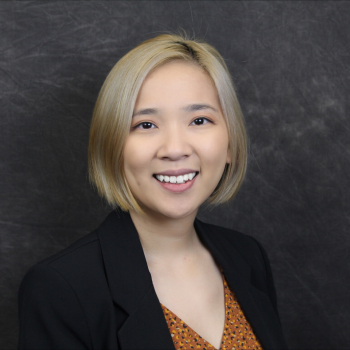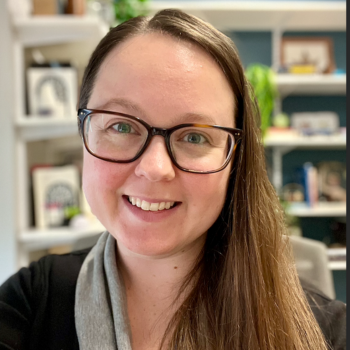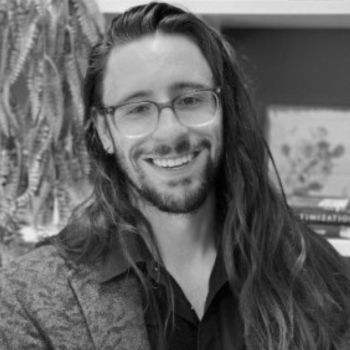People
Faculty Affiliate

Calli M. Cain, Ph.D. - Department of Criminology, Florida Atlantic University
Dr. Calli M. Cain joined Florida Atlantic University as an Assistant Professor in the School of Criminology and Criminal Justice in 2018. Her primary research interests include human trafficking, victimization, juvenile delinquency, corrections, and public opinion of criminal justice policy. Dr. Cain has published more than a dozen journal articles, technical reports, and book entries related to these topics. Her work has appeared in top journals in the field, including Violence & Victims, Journal of Quantitative Criminology, Criminal Justice & Behavior, Journal of Criminal Justice, and Criminal Justice Policy Review. She has also worked on several projects with the Nebraska Department of Correctional Services, the Douglas County Juvenile Justice System (in Omaha, NE), and the National Institute of Justice, among others. Her work with correctional and juvenile justice agencies focuses on improving evidence-based practices through the development and/or use of data, and the dissemination of evaluation findings to relevant stakeholders.

Caralin Branscum, Ph.D. - Department of Criminology, University of South Florida
Caralin C. Branscum, Ph.D., is an Assistant Professor in the Department of Criminology at the University of South Florida (USF) and is located on the St. Petersburg campus. Caralin received her Ph.D. in Criminology and Criminal Justice in 2024 from the School of Criminology and Criminal Justice (SCCJ) at the University of Nebraska at Omaha (UNO). Prior to this, received her B.S. and M.S. degrees in Criminology and Criminal Justice from Florida Atlantic University in 2018 and 2020. During her doctoral studies, she was affiliated with SCCJ’s Victimology and Victim Studies Research Lab, where she spent three years as the project coordinator for The Minnesota Sexual Assault Kit Research Project (2019-MU-MU-0095).

Colby Valentine, Ph.D. - Department of Criminology, University of South Florida
Colby Lynne Valentine, Ph.D. is an Assistant Professor of Instruction in the Department of Criminology. Dr. Valentine received her B.A. in Sociology with an emphasis in Criminal Justice from the University of Pacific (2005), her M.S. in Criminology and Criminal Justice from San Diego State University (2007) and her Ph.D. in Criminology and Criminal Justice from Florida State University (2012). Her research focuses on correctional-based research (i.e., prison misconduct, jail visitation, solitary confinement), victimization (i.e., sex and labor trafficking, intimate partner violence) and criminology and criminal justice pedagogy.

Fawn Ngo, Ph.D. - Department of Criminology, University of South Florida
Fawn T. Ngo is the Campus Chair of the College of Behavioral and Community Sciences. She's also an Associate Professor of Criminology at the University of South Florida Sarasota-Manatee campus. She received her B.A. in Criminology, Law and Society from the University of California at Irvine, her M.S. in Criminal Justice from the California State University at Long Beach, and her Ph.D. in Criminology and Criminal Justice from the University of Maryland. She worked as a Research Associate in the Research and Planning Unit at the Westminster Police Department in Orange County, California, and as the Associate Academic Director for the Master Criminal Justice Distance Learning Program at the University of Cincinnati.

Ieke de Vries, Ph.D. - Department of Criminology, The Institute of Criminal Law and Criminology
In her doctoral work, Ieke de Vries utilized unique online and administrative data to identify the spatial and social mechanisms that drive commercial sex and sex trafficking in illicit massage businesses in the U.S. Specifically, she examined the geographic and spatial features of census tracts and cities that have illicit massage businesses, analyzed the mobility of clientele through a spatial network approach, and evaluated the impact of police shutdowns on the overall geographic distribution of illicit massage businesses. Her research was awarded a Research Fellowship from the National Institute of Justice in the U.S. More broadly, her research agenda focuses on human trafficking and exploitation, law enforcement responses to emerging and newly defined crime types, digital opportunities for crime, risk factors for (repeat) victimization, and the broader socio-ecological context of crime. To investigate these themes, she employs quantitative and computational methods, sometimes in addition to qualitative approaches. Examples of these methods are qualitative interviews, digital research methods, regression analyses, social network analyses, spatial analyses, and machine learning. Ieke de Vries maintains a policy-oriented research agenda, which is rooted in her previous work as a policy researcher for the National Rapporteur on Trafficking in Human Beings and Sexual Violence against Children in the Netherlands. In her current work, she continues to collaborate with key stakeholders on national and international level.

Jessica Grosholz, Ph.D. - Department of Criminology, University of South Florida
Dr. Jessica M. Grosholz is an Associate Professor in the Department of Criminology at USF on the Sarasota-Manatee campus. She is also the Campus Chair, the Director of the Masters in Criminal Justice program, and a Research Administration Faculty Fellow. Dr. Grosholz earned her PhD from Emory University in 2014 working under the mentorship of Dr. Robert Agnew. Her research focuses on prisoner reentry and recidivism, health and crime, human trafficking, and qualitative field research. Dr. Grosholz’s research has been published in outlets such as Youth & Society, Criminal Justice & Behavior, Journal of Criminal Justice, Health & Justice, Social Science and Medicine, International Journal of Offender Therapy and Comparative Criminology, and Deviant Behavior.

Mateus Renno Santos, Ph.D. - Department of Criminology, University of South Florida
Mateus Rennó Santos is an Assistant Professor in the Department of Criminology at the University of South Florida. He received his BA and MA in Sociology from the Federal University of Minas Gerais, in Brazil, and his PhD in Criminology and Criminal Justice from the University of Maryland, College Park. He was previously a consultant for the United Nations Office on Drugs and Crime, in Austria, a researcher at the Center for Crime and Public Safety Studies, in Brazil, and a member of the Maryland Data Analysis Center, at the University of Maryland. His research focuses on crime and criminal justice trends, particularly on the drivers of changes in the rates of violence of populations, and on testing macro-level criminological theory. His recent research explores the drivers of a worldwide decline in violence.

Michael Baglivio, Ph.D. - Research & Development, Youth Opportunity Investments
Dr. Michael Baglivio earned his Ph.D. in criminology, law, & society from the University of Florida in 2007. He also holds an M.A. in sociology and an M.H.S. in rehabilitation counseling, both from the University of Florida. Dr. Baglivio serves as the vice president of research and development for Youth Opportunity, a private behavioral health company serving youth in the child welfare and juvenile justice systems across multiple states, after working ten years for the Florida Department of Juvenile Justice. Michael has over 60 published peer-reviewed academic articles examining the efficacy of juvenile justice reform initiatives, effective treatment dosage, and examining the pathways by which adverse childhood experiences manifest in deleterious physical and mental health and behavioral outcomes, among juvenile justice, child welfare, and “crossover” youth. Dr. Baglivio received the 2017 best paper of the year award from Youth Violence and Juvenile Justice for “A multilevel examination of risk/need change scores, community context, and successful reentry of committed juvenile offenders”.

Sandra Stone, Ph.D. - Department of Criminology, University of South Florida
Dr. Stone has experience both inside and outside academia in the fields of health, social services and education as a direct service provider, teacher, researcher, administrator and consultant. She has taught a wide range of courses in sociology and criminology, and her primary research interests are in family violence, juvenile delinquency/juvenile justice, women and crime, public policy, and program evaluation. Dr. Stone has served on a variety of boards, committees and task forces at the local, state and national levels, and, along with others, has obtained over $9 million dollars in grant funding to support various programs and projects. Current research activities include assessing social-emotional/problem-solving skills of elementary school children, working on a variety of projects with the USF Trafficking In Persons (TIP) Research Lab, and identifying the challenges to successful reentry into the community for formerly incarcerated individuals.

Sarah Lockwood, Ph.D. - Department of Criminology, University of South Florida
Dr. Sarah Lockwood is an Assistant Professor of Criminology at the USF St Petersburg campus. She received her B.A. in both Criminology and Psychology from USF, and her M.S. and Ph.D. in Criminology and Justice Policy from Northeastern University. Her research centers on the impact of victimization on individual outcomes, with emphasis on how victims intersect with formal institutions such as police and health care providers. She is interested in exploring new identification techniques and responses to historically underserved victim populations, primarily in the areas of sex trafficking and hate crime. Her work has examined various victimization populations and experiences, including how victim outcomes change due to the responses of formal institutions, including barriers to access, stigma, mental health, help-seeking, and reluctance to engage with formal institutions. She has worked on multiple local and national grants for both sex trafficking and hate crime to better capture the needs of crime victims within and beyond the criminal justice system.

Stephen Abeyta, Ph.D. - New York University
Dr. Abeyta is a Postdoctoral Associate in the Human Exploitation and Resilience program at the NYU Marron Institute of Urban Management. He received his Ph.D. from Northeastern University’s School of Criminology and Criminal Justice where his dissertation focused on work and labor-related victimization, particularly the victimization of marginalized workers. His scholarship generally focuses on work and labor-related issues, and has published this work in academic journals such as Aggression and Violent Behavior, Psychological Trauma: Theory Research, Practice, and Policy, and Journal of Adolescent Health.

Tiffany Chenneville, Ph.D. - Department of Psychology, University of South Florida
Dr. Tiffany Chenneville is the Marie E. and E. Leslie Cole Endowed Chair in Ethics and Professor of Psychology at the University of South Florida. She holds a Joint Appointment in the Department of Pediatrics where she serves as a Behavioral Health Consultant for the Pediatric and Adolescent Infectious Disease Program, which provides services to children and youth living with HIV in an integrated care setting. Dr. Chenneville’s primary program of research focuses on the psychosocial issues affecting children and youth living with or at risk for HIV along with broader issues related to sexual health. She also is interested in professional and research ethics. Dr. Chenneville is committed to cross cultural research and has collaborated with colleagues in Kenya, South Africa, India, England, and Canada. Dr. Chenneville has contributed significantly to the literature with dozens of peer-reviewed journal articles and book chapters as well as an edited book on pediatric HIV published by Springer. As evidence of her global impact, Dr. Chenneville received a Fulbright Canada Research Chair Award in 2021 to support her work in the Psychology Department at York University in Toronto and a Fulbright Specialist Award in 2018 to support her work at the Perinatal HIV Research Unit at the University of Witwatersrand in Johannesburg, South Africa. Among many other awards, Dr. Chenneville is the recipient of the 2022 USF St. Petersburg Campus Women in Leadership and Philanthropy Kathleen Moore Faculty Excellence Award.